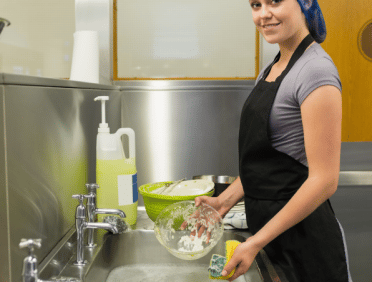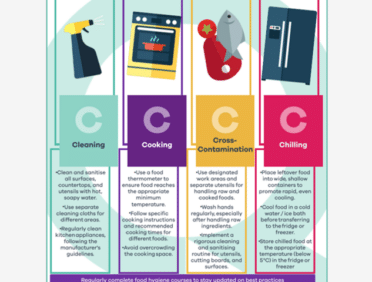The Level 3 Food Hygiene Safety Training
Culinary craftsmanship is where the alchemy of flavours meets the precision of technique, and the quest for culinary perfection is intertwined with a firm commitment to food safety.
The Level 3 Food Safety Training Course takes this commitment to new heights, serving as a beacon for anybody looking to understand the advanced complexity of preserving public health within the specific contours of the UK’s culinary ecology. In this in-depth inquiry, we will go over the advanced levels of information and abilities covered in level 3 food safety training, immersing ourselves in a transformative journey where awareness becomes an art and accountability becomes a culture.
Microbiology and Foodborne Illnesses
The microscopic realm comes to life as level 3 food safety training reveals the complexity of microbiological risks, those invisible threats with far-reaching implications. Beyond their theoretical knowledge, participants investigate real-world instances particular to the United Kingdom, examining outbreaks and their impact on public health.
The course acts as a link between the unseen microbial world and the tangible consequences that necessitate more attentiveness.
Participants expand on this knowledge by looking into the intricate ways bacteria, viruses, and other microorganisms interact with foods. A thorough understanding of their aetiology and survival mechanisms emerges, enabling a more comprehensive approach to preventive measures. The session discusses both scientific and practical implications for food companies operating under UK legislation.
Supervisory Management in Food Safety
The move from practitioner to leader in the field of food safety management is a critical stage covered in the supervisory management component of the Level 3 food safety training course. As participants rise to leadership positions, the course teaches advanced ideas that combine theory with practical applications tailored to the UK regulatory system.
Understanding the legal complexities becomes critical with a thorough examination of the Food Safety Act of 1990 and associated regulations. The seminar clarifies legal jargon and provides supervisors with concrete insights to ensure team compliance.
Through case studies and interactive scenarios, participants learn how to confidently lead while navigating the intricate legal maze.
Legislation and Regulatory Compliance
The regulatory landscape governing food safety in the UK resembles a maze, with Level 3 training guiding participants through its twists and turns. A thorough examination of the Food Safety Act 1990, the Food Hygiene Regulations, and other pertinent legislation gives a solid foundation.
Participants become fluent in the language of compliance rather than simply receiving legal knowledge. Practical scenarios and case studies from the UK’s diverse culinary scene guarantee that legal principles are not abstract abstractions but rather tangible instructions for daily operations.
The course instills a sense of responsibility in food industry owners, managers, and supervisors, encouraging them to view compliance as a shared objective rather than a burdensome requirement.
HACCP Principles and Implementation
The implementation of Hazard Analysis and Critical Control Points (HACCP) principles progresses from academic comprehension to actual expertise in Level 3 training. Participants are immersed in scenarios requiring sophisticated HACCP implementation in a variety of culinary contexts.
The course goes beyond the fundamentals, enabling participants to create customised HACCP plans that reflect the complexities of their individual food operations. Case examples demonstrate the applicability of HACCP, emphasising its effectiveness in preventing foodborne hazards in a variety of culinary situations.
Food Safety Management Systems
Level 3 training emphasises the development and implementation of effective food safety management systems. Participants are guided through the creation of strong systems that go beyond compliance, building a culture of excellence in food safety management.
The training teaches learners to see food safety systems as dynamic frameworks that respond to changing standards. Practical activities include the development and evaluation of management systems, ensuring that participants leave with not only theoretical knowledge but also a real skill set to apply in their employment.
Auditing and Monitoring
As participants progress through Level 3 training, the emphasis on auditing and monitoring becomes critical to providing thorough oversight of food safety measures. Participants learn how to conduct internal and external audits, giving them the tools they need to examine and improve their own systems.
The course explores the complexities of audit strategy, execution, and follow-up. UK-specific rules for evaluating food safety processes are included, ensuring that participants are well-prepared to meet regulatory requirements. The goal is not only compliance but also a proactive attitude towards ongoing improvement.
Allergen Management: Addressing Silent Threats
Allergen management takes front stage as Level 3 training reveals the intricacies of managing allergens in the UK food industry. Participants get a thorough understanding of allergies, including detection, prevention, and communication with customers.
Scenarios particular to the UK market highlight the complexities of allergy control, emphasising the repercussions of failure. The Level 3 food safety training will teach participants how to implement effective allergy management measures, ensuring that allergy-related dangers are addressed with precision and care.
Personal and Staff Hygiene: Elevating Standards for Supervisors
Level 3 supervisory training improves personal and staff cleaning habits. Participants who are now ready to take on leadership roles will learn how to establish and maintain high personal hygiene standards across their organisations.
The course includes not only the fundamentals of personal cleanliness but also the psychology of behaviour modification. Supervisors emerge not only as rule enforcers but also as influencers capable of instilling a clean and responsible culture. Personal and staff hygiene norms relevant to the United Kingdom are integrated to ensure compliance with regulatory requirements.
Temperature Control and Monitoring
The advanced concepts of temperature control lead participants on a voyage of precision in every degree. Level 3 food safety training goes into the complexities of maintaining proper temperatures during various food handling activities.
Participants learn about essential places where temperature management is important, from refrigeration procedures to cooking temperatures. Temperature control rules particular to the United Kingdom are stressed, ensuring that participants’ activities are in conformity with local regulatory bodies’ expectations.
Food Safety Culture: Fostering Responsibility at Every Level
The level 3 food safety training concludes with an in-depth look at how to cultivate a food safety culture inside an organisation. Participants are empowered to establish a shared responsibility for food safety at all levels, from top management to front-line employees.
Real-world case studies from the United Kingdom demonstrate how a strong food safety culture affects both public health and the performance of food businesses. The seminar goes beyond theoretical talks to provide practical solutions for establishing a culture of accountability that extends beyond everyday routines.
In essence, Level 3 Food Safety Course Training is more than just a continuation of basic principles; it is a transforming journey that propels learners to the forefront of culinary attentiveness. Graduates of the Level 3 food safety training course are not simply practitioners; they are leaders capable of navigating the complexity of food safety with competence, confidence, and an unshakable dedication to quality.
Food Safety Online Training
If you haven’t already got it, one way to start training yourself and your colleagues is to take a Food Hygiene course.
- Level 2 Food Safety Training: is an introductory course that covers basic food safety principles and practices. This qualification is designed for anyone who works with food, including front-line staff and supervisors. The course typically covers topics such as food hygiene, food contamination, food storage and preservation, and personal hygiene.
- Level 3 Food Safety Training: is an advanced course that provides a more detailed understanding of food safety principles and practices. This qualification is designed for managers and supervisors who have responsibility for food safety in their workplace. The course typically covers topics such as food safety legislation, HACCP principles, risk assessment, and management of food safety hazards.
Level 2 training is more basic and suitable for front-line staff, while Level 3 training is more advanced and suitable for managers and supervisors with greater responsibility for food safety in their workplace.
All of our courses have discounts for 10+ orders
Or SAVE OVER 50% and ensure your business is even safer by choosing one of our bundles:













